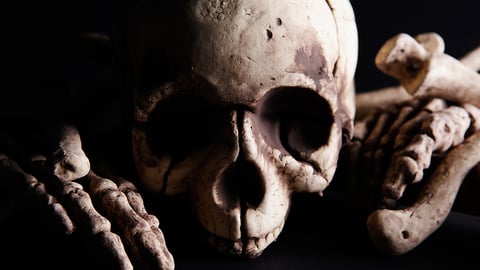Halloween Horror
It can be depressing seeing all the skulls, gravestones and bodies hung by the neck—all in our neighborhood! Why do so many celebrate death and gore?

I was a wimpy preschooler—afraid of the dark, fascinated and frightened by Godzilla, terrified by The Twilight Zone (which thankfully my parents wouldn’t let me watch).
I don’t really like gore, evil or death. I’m not sure why horror films are so popular or why ghastly Halloween decorations seem to be spreading. Why do Americans spend more than $10 billion on Halloween?
I may seem out of step, but I’m sure there are others like me. It makes me wonder, what is an impressionable child to make of all the dark, evil and violent themes of this Halloween season of the year?
In my neighborhood
When I go running in my neighborhood in the early mornings before Halloween, I’m greeted by skulls and cobwebs, witches and cauldrons, graveyards and ghosts, bodies hung by the neck and a huge inflatable black cat with evil-looking electric eyes.
Then there are the popular costumes, like grotesque zombies and blood-sucking vampires.
And, of course, there are all the horror movies! The TV commercials alone are enough to give an innocent child recurring nightmares.
Scary statistics
Consider some scary statistics from an Oct. 24, 2024, Investopedia article, “Halloween’s Effect on the Economy.”
- Spending on Halloween costumes: $3.8 billion.
- Spending on Halloween candy: $3.5 billion.
- Spending on Halloween decorations: $3.8 billion.
Why is Halloween, a celebration of evil and darkness growing, while God’s festivals are almost unknown?
What are Christian parents thinking?
Why do many Christian parents allow—even encourage—their kids to participate in the customs of an ancient pagan holiday?
Why focus on dark, sinister and evil themes of violence and death?
What was the origin of Halloween?
According to History.com, Halloween comes from an ancient Celtic festival.
“Celts believed that on the night before the new year [which they celebrated Nov. 1], the boundary between the worlds of the living and the dead became blurred. On the night of October 31 they celebrated Samhain, when it was believed that the ghosts of the dead returned to the earth. In addition to causing trouble and damaging crops, Celts thought that the presence of the otherworldly spirits made it easier for the Druids, or Celtic priests, to make predictions about the future.”
God tells us He doesn’t want us to focus on witches, wizards and the dead, but to look to Him and His law.
As the Catholic Church spread to Celtic lands, it added a festival at that time of year also dealing with the dead.
“It is widely believed today that the church was attempting to replace the Celtic festival of the dead with a related, but church-sanctioned holiday. All Souls’ Day was celebrated similarly to Samhain, with big bonfires, parades, and dressing up in costumes as saints, angels and devils. The All Saints’ Day celebration was also called All-hallows or All-hallowmas (from Middle English Alholowmesse meaning All Saints’ Day) and the night before it, the traditional night of Samhain in the Celtic religion, began to be called All-hallows Eve and, eventually, Halloween.”
What does God say?
Obviously Halloween was not commanded in the Bible. In fact, God told His people not to copy the religious customs of the pagan nations around them.
“Do not inquire after their gods, saying, ‘How did these nations serve their gods? I also will do likewise.’ You shall not worship the LORD your God in that way; for every abomination to the LORD which He hates have they done to their gods” (Deuteronomy 12:30-31).
Witchcraft is not cute and quaint to God. To Him it is akin to rebellion (1 Samuel 15:23). In fact, being a medium who claimed to contact the dead was a capital offense (Leviticus 20:27), as was murder.
God has holy days that He wants us to celebrate, yet few people do today. His holy days have great meaning and show us how to walk in the light now and enter the bright future He has for us!
But too often Christians have chosen to celebrate days that were originally part of pagan religions. Days like Halloween don’t celebrate God’s way of light, but the ways of darkness.
For more about the days that God does want us to celebrate, see our article “Hope for the Future Found in God’s Festivals.”
Date Posted: October 29, 2025



